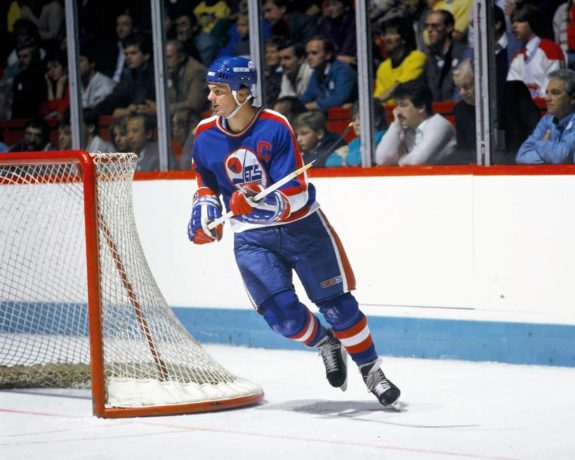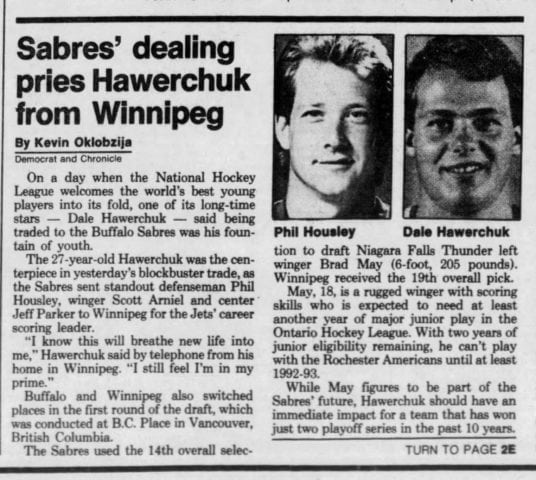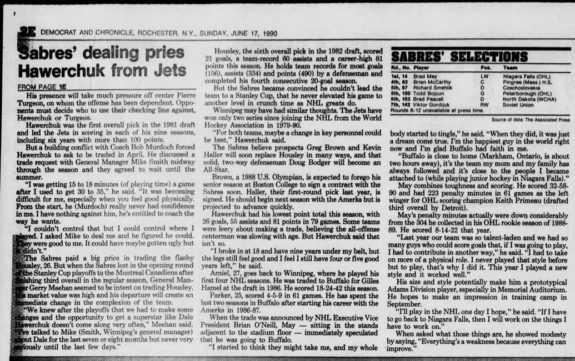Beginning in 1981, Dale Hawerchuk became one of the most dominant centers in the National Hockey League and was the face of the Winnipeg Jets. After a junior career in the QMJHL in which he scored 81 goals and 102 assists in all of 72 games for the 1980-81 Cornwall Royals , he was at the top of the draft charts. Winnipeg selected Hawerchuk with the first overall pick of the 1981 NHL Entry Draft. From there he forged a 16-year career that ended in Hockey Hall of Fame induction.
The finest years of Hawerchuk’s success came as a Jet and lasted for nearly a decade. Therefore, when he was eventually moved from Winnipeg to a rightful suitor, it became a landmark move that kicked off the NHL of the 1990s with blockbuster fashion. The man affectionately known as “Ducky” was bade farewell from Manitoba, and forged the later portion of his great career. All with one eye-popping move.
Setting the Stage
During the 1980s it seemed that nearly every NHL team had a premier centerman. “The Great One” in Edmonton with the Oilers. The Penguins belonged to “Super Mario” in Pittsburgh. Then you had Denis Savard with Chicago, Bernie Federko with St. Louis, Bryan Trottier on Long Island, Peter Stastny in Quebec City, Ron Francis with the Hartford Whalers, and so on and so forth.
Though star centers were in abundance, the Jets’ Hawerchuk was arguably one of the top-five in the game for the entire decade. He would win the Calder Trophy in 1982 as the NHL’s Rookie of the Year after scoring 45 goals and 58 assists for 103 points during his first season. Hawerchuk would score 100 points or more five more times for Winnipeg – six times total in just nine seasons. His highest point total was seen during the 1984-85 season when he scored 53 goals (a career high), 77 assists and 130 points in 80 games.

Hawerchuk and the Jets would miss the playoffs for the 1988-89 season. This would be the first and only time the team did not make the postseason during his tenure. The next year, after never falling below 91 points, Hawerchuk’s numbers slipped substantially by his standards in what would be his final season in Winnipeg. This was by no means a sign of aging or an off season for the star center. Rather, first-year Jets Head Coach Bob Murdoch decreased Hawerchuk’s ice time and tensions mounted between the two.
“I was getting 15 to 18 minutes (of playing time) a game after I used to get 30 to 35”, Hawerchuk was quoted as saying in a Jun. 17, 1990 article by Kevin Oblobzija of the Rochester NY Democrat and Chronicle. “It was becoming difficult for me, especially when you feel good physically. From the start, he (Murdoch) really never had confidence in me. I have nothing against him, he’s entitled to coach the way he wants.”
Midway through the 1989-90 season, Hawerchuk requested a trade of Winnipeg GM Mike Smith. Both Smith and his centerman agreed that it would be best to wait until the summer to complete the deal. For the 1989-90 NHL campaign Hawerchuk scored 26 goals and 55 assists for 81 points – the lowest goal and point totals of his time in Winnipeg. Though Murdoch’s Jets assembled a winning record of 37-32-11, they would suffer an opening round playoff loss in seven games to the Edmonton Oilers. Hawerchuk led the team in playoff scoring that final year with three goals and five assists in the seven games. By this point though, the damage had already been done and there was no reconciling between he and Murdoch.
Hawerchuk Is Shuffled off to Buffalo
True to his word, Smith would grant Hawerchuk his trade request after the 1989-90 season ended. Though he knew that he would be moving onward, the star center knew not where he would be going. In what many referred to as “The Dale Hawerchuk Sweepstakes”, a trade would need to come at sizable cost no matter which team ended up obtaining his services. Players of Hawerchuk’s skill level rarely came along, and most oftentimes there would be great hesitancy in parting ways with one. The Jets of course needed a willing partner who had the goods worth swapping for.

General Manager Gerry Meehan and the Buffalo Sabres were willing to tango. The 28th NHL Entry Draft was held on Jun. 16, 1990 in Vancouver, BC, CA, with the Canucks played host. With some tremendous prospects waiting anxiously to be selected, Meehan and Smith pulled off a blockbuster deal that was announced for everyone present to hear. The Jets shipped Hawerchuk and their own first round selection to the Sabres in exchange for All-Star defenseman Phil Housley, perennial third-liner Scott Arniel, tough guy Jeff Parker, and Buffalo’s top pick in the draft.
After the swap, the Sabres then possessed the 14th overall selection in the draft, while Winnipeg lowered down to 19th. Subsequently, both teams would draft big, powerful wingers who each considered to have a scoring touch. Buffalo would draft Brad May, while Winnipeg opted to select Keith Tkachuk.
In retrospect, the swapping of draft picks is very interesting to contemplate. May, who never scored more than 18 goals in an NHL season played 18 years in the NHL and won a Stanley Cup with the Anaheim Ducks in 2007. He played parts of seven seasons with Buffalo – the longest stay of his lengthy career.

Tkachuk on the other hand, who never won the Cup, goes down as one of the best USA-born players in league history. He also played 18 seasons and scored 538 goals and 1,065 points – far more than May’s numbers of 127 goals and 289 points. Tkachuk played almost a full decade with the Winnipeg/Phoenix/Arizona franchise, and only played one full NHL season in which he did not score at least 20 goals.
In terms of draft picks, Winnipeg got the better player.
How the Deal Panned out for Winnipeg
When we consider the two teams and how their respective history panned out after the trade took place, Buffalo made out with the better end of the deal. This stems from production, team performance, and longevity of the players involved with the deal.
Let’s look first at Winnipeg’s payout. The centermost piece of the deal for the Jets was Housley. An eventual Hockey Hall of Famer himself, the smallish defender was one of the better offensive-defensemen of his generation. He often was overshadowed during the 1980s by Paul Coffey and Ray Bourque, but in an offensive era he was one of the best. Housley had scored double digits in goals in every year since he had been in the league, and assembled more of the same after arriving in Winnipeg.
During his three years with the Jets his point totals went up each season, with him scoring 23 goals in each of his first two years. The highest seasonal totals that Housley ever produced for assists and points came during his 1992-93 season in Winnipeg – 79 helpers and 97 total points in 80 games that year.
Jeff Parker and Scott Arniel were more so role players. Parker never ended up playing a game for Winnipeg. Sadly, he passed away at age 53 on Sept. 11, 2017 from complications of heart and lung infections. Arniel, who had actually began his career with the Jets before coming to Buffalo in a 1986 trade between the two teams, played just the 1990-91 season in Winnipeg and then finished out his career with a brief stay in Boston the following year.
How the Deal Panned out for Buffalo
The Sabres were certainly the ones who got the better return on the deal. Hawerchuk played five years with the Sabres as opposed to Housley’s three in Winnipeg. Furthermore, he brought about more of a symbiotic relationship at the center position for Buffalo. Playing his first year with the Sabres and fellow center Pierre Turgeon, followed by four alongside Hall of Fame center Pat LaFontaine, the one-two punch of Hawerchuk and Turgeon/LaFontaine down the middle alleviated pressure from each center and paid major dividends for the Sabres.
Hawerchuk’s scored his 1,000th NHL point during his first season in Buffalo, coming Mar. 8, 1991 against Chicago when he tallied a power play goal – it took him only 781 games to accomplish the feat. Except for the lockout shortened 1994-95 season, Hawerchuk never scored less than 86 points during his four full seasons with the Sabres. Furthermore, he set his career high in assists during the 1992-93 season when he had 80 of them in 81 games, and also scored 16 goals. During that year’s postseason Hawerchuk had his highest playoff point total of his career when he scored five goals and nine assists for 14 points in eight contests.
With extensive injuries happening to LaFontaine in the 1991-92 and 1993-94 seasons, Hawerchuk oftentimes assumed the role as the premier center in Buffalo and did so quite well. His performance as a Sabre was enough that he would eventually be inducted into the Buffalo Sabres Hall of Fame in 2011.
The Eventual Evenness of the Deal
When we look back at the deal all these years later, there is a certain evenness to both sides. Neither Buffalo nor Winnipeg won a Stanley Cup out of the deal. Each team received an eventual Hockey Hall of Famer. The only player conceivably involved to win a Cup was May, and he did so many years afterward. Tkachuk had the longest tenure with one of the teams after the trade took place. Still, it is hard to even count May and Tkachuk as true pieces in the deal, since neither was specifically named in the transaction – they were simply who each team chose after the main swap was all said and done.
If there is an edge it has to go to the Sabres for gaining Hawerchuk. He was the centerpiece. While Housley was always thought highly of – and still is to this day – Buffalo got on well enough without him. Parting ways with Hawerchuk on the other hand, broke the collective hearts of Winnipeg. No matter how you look at it, his departure from the Jets and arrival in Buffalo is the main crux. To this day Murdoch’s brief tenure with the team sticks in the craw of Winnipeg fans as it ultimately culminated in the farewell of their beloved superstar.